Overview
For many startups, navigating the complexities of B2B social media marketing can feel overwhelming. Establishing clear goals, identifying the right target audience, and selecting the most suitable platforms are just a few of the hurdles that can leave founders feeling anxious about their brand's visibility. This uncertainty can lead to missed opportunities for engagement and growth, which is a concern shared by many in the startup community.
But there is hope. By creating engaging content and measuring performance metrics, startups can take proactive steps toward overcoming these challenges. These strategies are not just essential; they are transformative. Data shows that when objectives are targeted and content is diverse, meaningful interactions and conversions become possible in the B2B landscape.
At RNO1, we understand the struggles and triumphs of tech startup founders. We are here to support you as you enhance your brand visibility and foster genuine connections. Together, we can navigate the path to success in the ever-evolving world of B2B social media marketing.
Introduction
Navigating the complex landscape of B2B social media marketing can feel like an overwhelming challenge for startups. Many founders find themselves unsure of where to begin, grappling with the weight of establishing their online presence.
It’s crucial to set clear goals and understand your audience, as these steps can significantly enhance your effectiveness. Yet, it’s all too common for startups to struggle with aligning their social media strategies with broader business objectives. This misalignment can lead to missed opportunities for growth and engagement, leaving founders feeling even more frustrated.
So, what are the key strategies that can empower you—these fledgling companies—to not only set measurable goals but also connect authentically with your target audience? Together, let’s explore how to navigate this journey with confidence and clarity.
Establish Clear Goals and Objectives for B2B Social Media
For startups, navigating the world of online platforms in [B2B social media marketing](https://blog.gaggleamp.com/social-media-marketing-statistics) can feel overwhelming. Many founders struggle with setting clear, measurable objectives, which are crucial for success. These goals might include increasing brand awareness, generating leads, or enhancing customer engagement. Imagine a tech startup that aspires to increase its LinkedIn followers by 25% within six months. This specific and measurable target not only provides clarity but also makes tracking progress straightforward.
However, aligning these online goals with broader business objectives is essential. It ensures that every online initiative contributes meaningfully to the company's growth and success. Consider this: 75% of purchasers rely on B2B social media marketing through online platforms to inform their buying decisions. This underscores the need for a diverse strategy that enhances effectiveness. As Emily Gittings, a brand marketing executive, wisely points out, having measurable objectives is vital for crafting campaigns that truly drive results.
Moreover, industry experts remind us not to limit ourselves to just LinkedIn. A varied online strategy that incorporates B2B social media marketing is crucial for maximizing impact. With 73% of startups leveraging online platforms for brand recognition, establishing clear objectives can significantly boost visibility, foster engagement, and contribute to B2B social media marketing efforts. Yet, it's important to be aware of . Establishing vague objectives or neglecting to monitor progress can hinder the effectiveness of online efforts.
By embracing clarity and variety in your online strategies, you can navigate these challenges with confidence and compassion, paving the way for your startup's success.
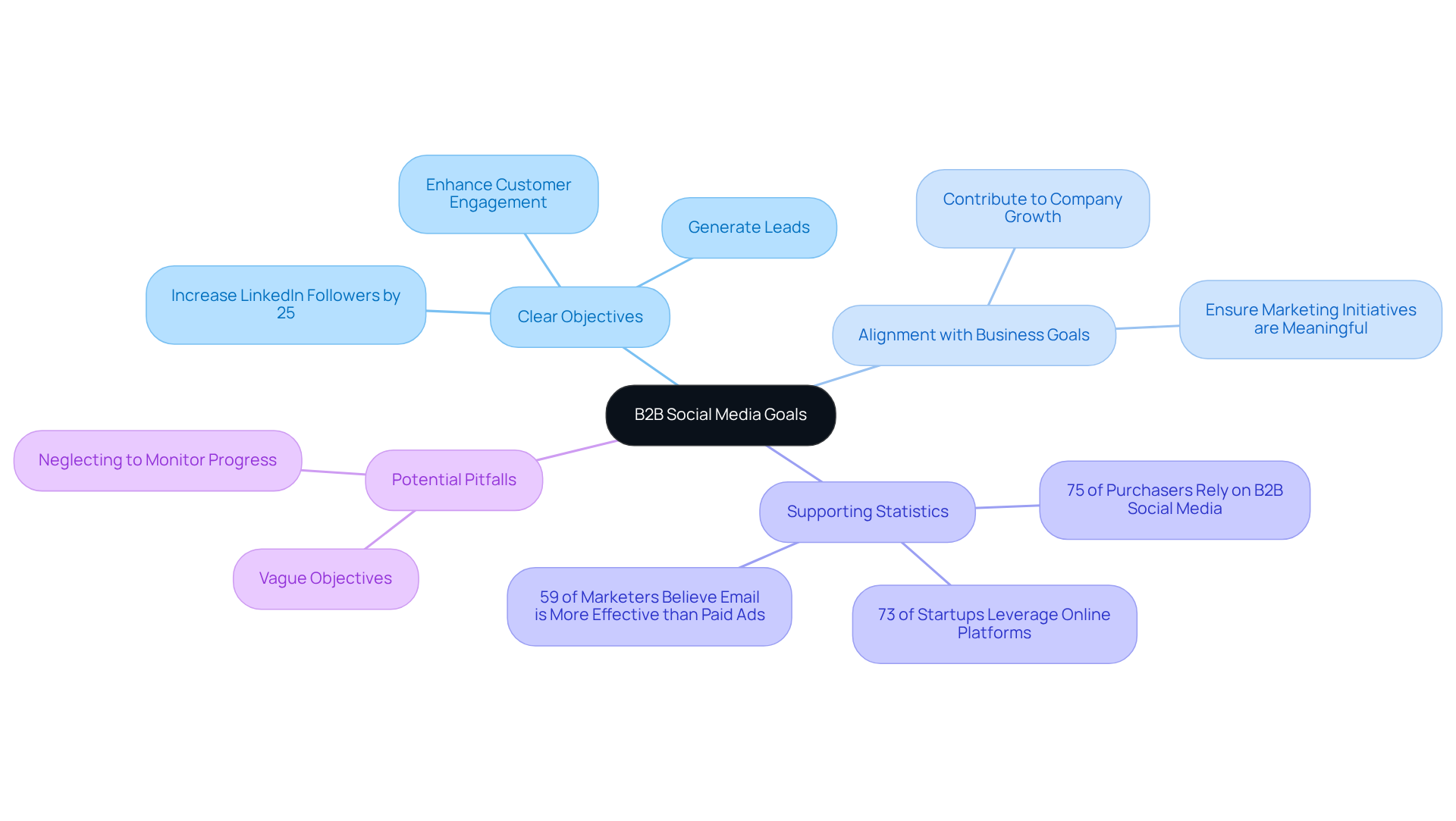
Identify and Understand Your Target Audience
Identifying your target group can feel overwhelming, especially when you're striving to understand their needs, preferences, and behaviors. This challenge is not uncommon among tech startup founders. It’s essential to engage in thorough research, utilizing tools like surveys, online analytics, and customer feedback to gather insights that truly matter.
For example, a B2B software company might discover that their primary audience comprises IT managers aged 30-45, who value efficiency and cost-effectiveness. This insight is crucial, as 83% of [B2B marketers use B2B social media marketing analytics](https://sellerscommerce.com/blog/b2b-marketing-statistics) as a performance metric, highlighting how vital these tools are in understanding consumer preferences.
By developing viewer profiles rooted in this data, companies can tailor their content to resonate with the specific interests and challenges of their target audience. This strategy not only fosters deeper engagement but also with the genuine needs of the market.
Furthermore, industry leaders remind us that effective consumer research is the cornerstone for tech startups aiming to build a robust market presence and fuel growth. As noted by LinkedIn, '80% of B2B buyers use mobiles throughout the buying journey,' which underscores the importance of grasping audience behaviors in our increasingly digital world.
Remember, you’re not alone in this journey; understanding your audience is a shared experience that can lead to meaningful connections and success.
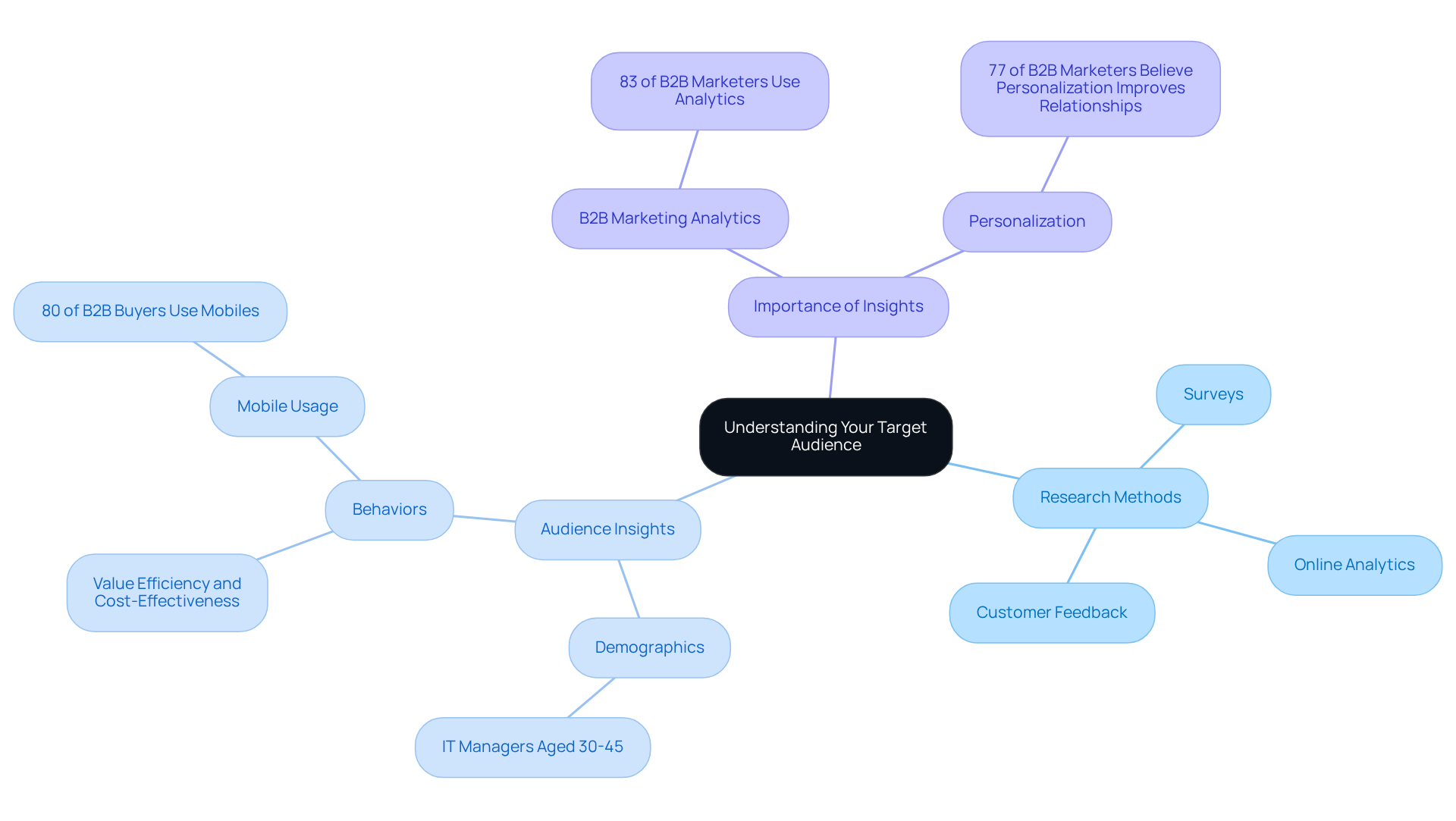
Choose the Right Social Media Platforms for Engagement
Choosing the right online platforms is crucial for B2B social media marketing, and it can feel overwhelming for B2B marketers to get it right. Many struggle to find the best ways to connect with their audience. LinkedIn emerges as a beacon of hope in this landscape. With 84% of using it to research products and services, it’s clear why it’s the premier choice. Furthermore, an impressive 89% of B2B marketers leverage LinkedIn to generate leads, showcasing its undeniable effectiveness. This platform’s professional focus and networking capabilities create a nurturing environment for sharing industry insights, such as reports and case studies, allowing companies to position themselves as thought leaders. For instance, imagine a cybersecurity firm using LinkedIn to share valuable content that highlights its expertise—this not only builds credibility but also fosters trust. Brian Solis reminds us that these online platforms empower B2B companies to showcase their knowledge, underscoring the significance of B2B social media marketing and LinkedIn's pivotal role in our strategies.
But don’t stop there; consider also embracing Twitter for real-time engagement. With 60% of B2B marketers utilizing this platform, it can be a powerful tool for quick interactions and updates. Facebook, on the other hand, is perfect for building community connections, with 79% of B2B marketers tapping into its potential. Each platform serves a unique purpose:
- Twitter allows for immediate conversations,
- Facebook nurtures deeper connections through group discussions and events.
It’s essential to reflect on where your audience spends their time and adapt your strategy accordingly. By aligning your B2B social media marketing with the preferences of your followers, you can enhance engagement and foster meaningful interactions.
Moreover, integrating SEO into your strategy is vital. It drives 14.6% of all leads for B2B businesses, ensuring a well-rounded approach to digital marketing. As you navigate these platforms, remember that you’re not alone. Many others share your journey, and by collaborating and sharing insights, we can all grow together in this dynamic landscape.
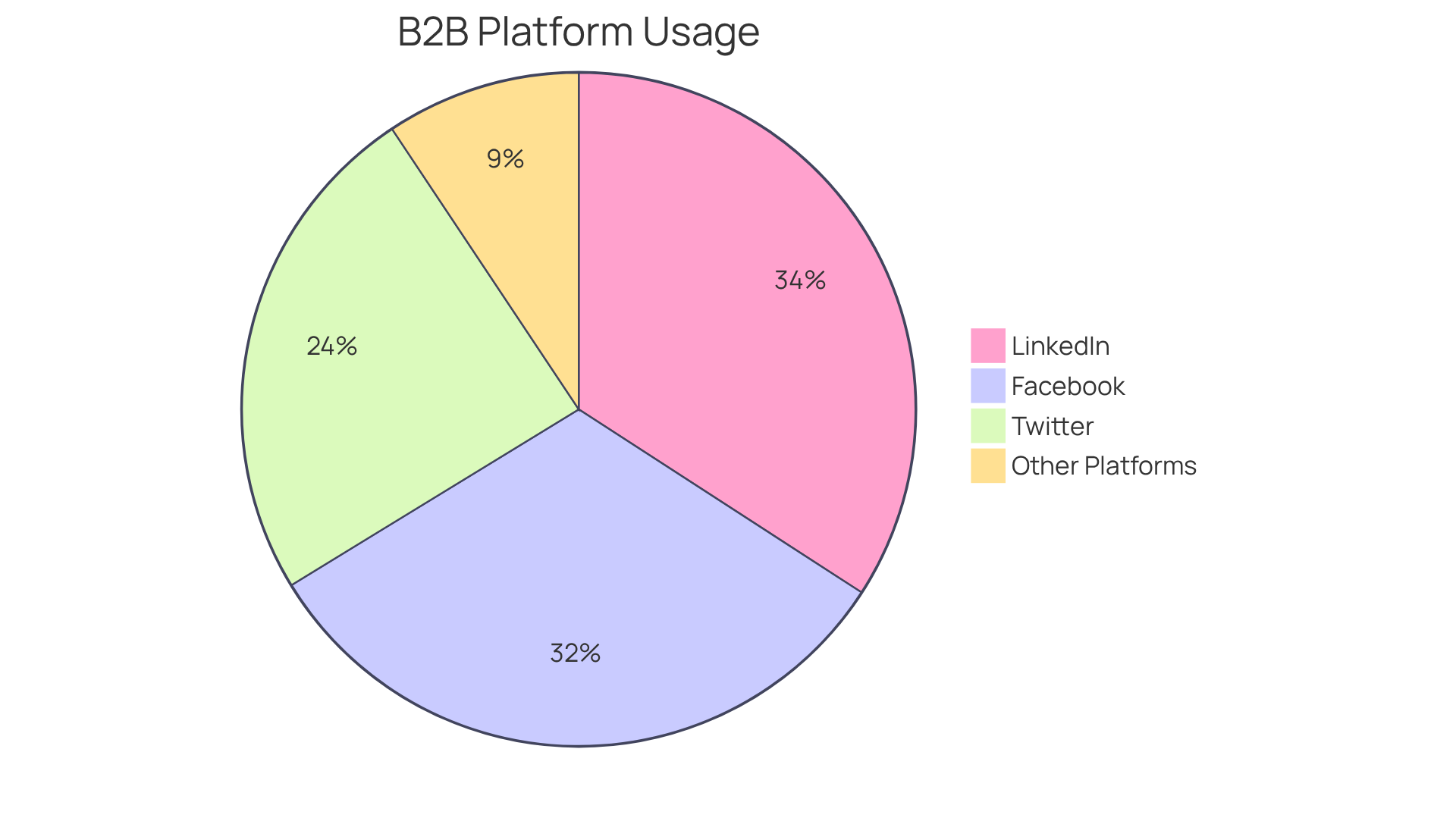
Develop Engaging Content Types for B2B Audiences
Engaging B2B groups can often feel like a daunting challenge. Many tech startup founders struggle to capture the attention of their audience, leading to frustration and missed opportunities. This is a common pain point, where the need for effective communication becomes critical.
Imagine the impact of diversifying your content types—this is where the solution lies. By creating:
- Informative blog posts
- Engaging videos
- Visually appealing infographics
you can simplify complex information and make it more accessible. For instance, a SaaS company might share a series of tutorial videos that illustrate how their software addresses specific business challenges, providing clarity and value.
Moreover, hosting webinars can be a powerful way to share valuable insights while fostering direct interaction with potential clients. This not only enhances engagement but also builds a sense of community.
Remember, tailoring your content to address the specific pain points of your target group is essential. It shows empathy and understanding, ultimately driving conversions and creating lasting relationships. Your efforts in can transform the way you connect with your audience, offering them the support they need in their journey.
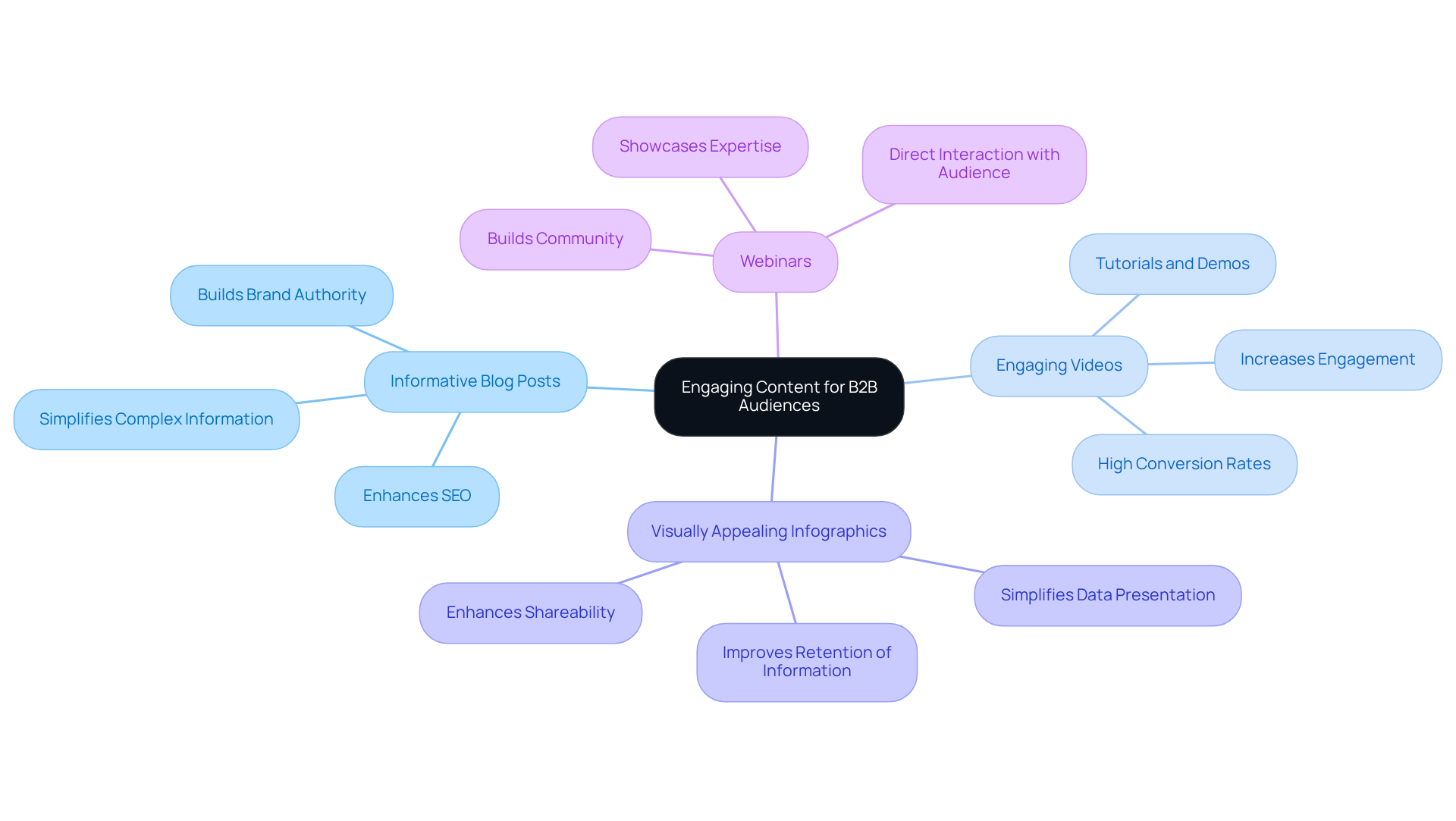
Measure and Analyze Social Media Performance Metrics
To drive successful [B2B social media marketing](https://rno1.com/work), many founders encounter the challenge of consistently measuring and analyzing performance metrics. It can be disheartening to see key metrics like engagement rates, click-through rates (CTR), and conversion rates not aligning as expected. For example, a tech startup might discover a promising engagement rate of 2% on LinkedIn posts, suggesting strong interest from viewers. However, a low conversion rate of 1.5% can feel discouraging. This discrepancy highlights the need to refine call-to-action strategies, gently guiding potential clients through their sales journey.
Utilizing can provide valuable insights into which content types truly resonate with your audience. Consider this: case studies reveal that posts featuring client success stories garner an average of 600 views, significantly boosting engagement. Moreover, with 84% of B2B executives relying on online platforms for their purchasing decisions, the importance of B2B social media marketing through creating engaging content that fosters conversions becomes clear.
Industry professionals emphasize the need to focus on quality engagement over sheer volume. As Cecilia wisely pointed out, 'By shifting your attention from vanity metrics to performance-driven indicators like lead quality, pipeline attribution, and conversion impact, your online strategy becomes a measurable asset—not just a digital presence.' By continuously analyzing these metrics and adjusting strategies accordingly, startups can enhance their social media effectiveness and demonstrate tangible ROI. Remember, you are not alone in this journey; by embracing these insights and fostering a supportive community, your path to success can be illuminated.
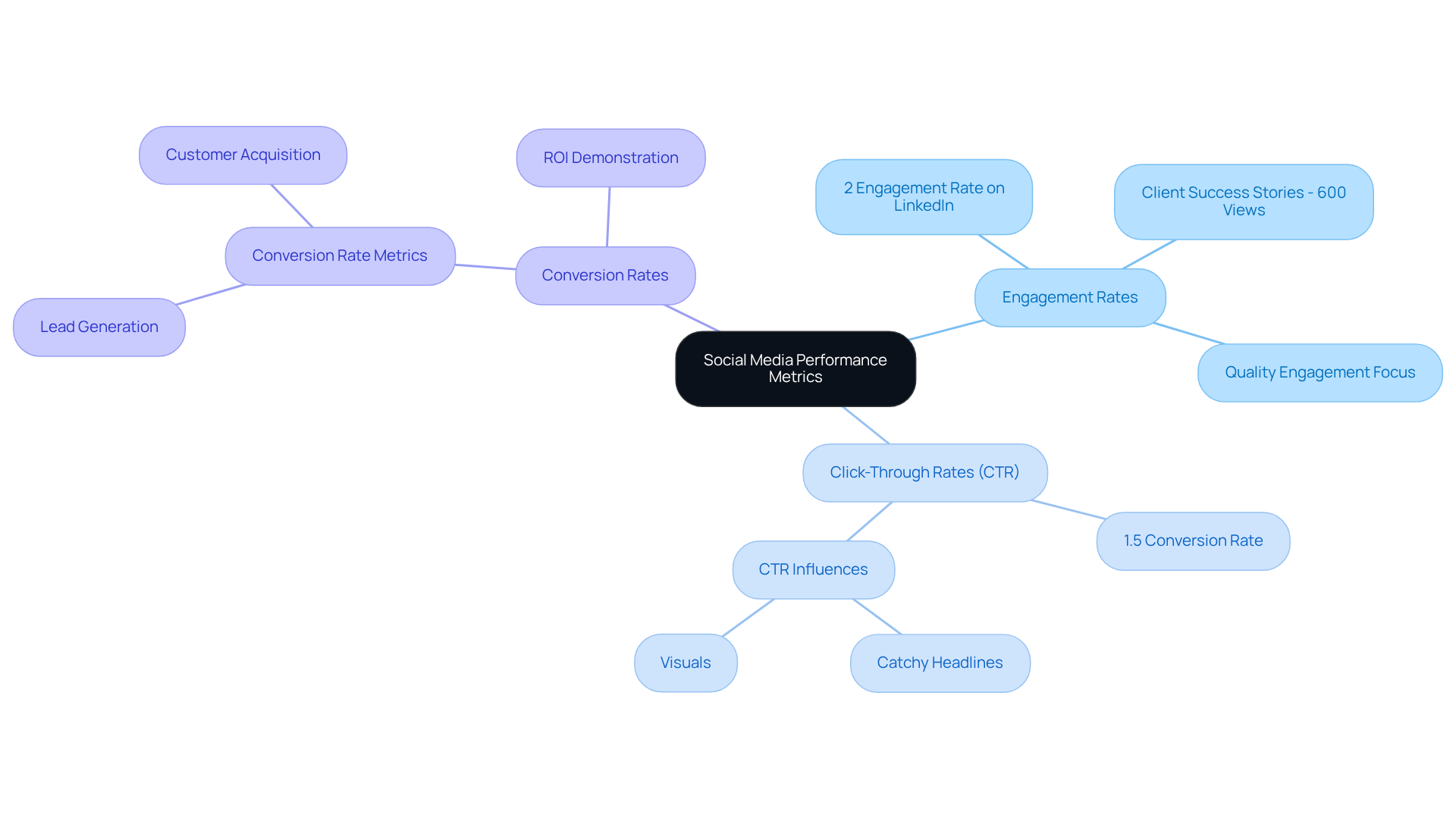
Conclusion
Establishing a robust B2B social media marketing strategy can feel overwhelming for startups striving to find their footing in a competitive landscape. The pressure to succeed often weighs heavily, but by setting clear goals and objectives, understanding your target audience, selecting the right platforms, creating engaging content, and consistently measuring performance, you can navigate the complexities of digital marketing with greater ease. Each of these elements is crucial in ensuring that your marketing efforts not only reach but truly resonate with potential clients.
Many founders share the struggle of defining measurable objectives that align with broader business goals. This challenge can lead to frustration, especially when audience research feels daunting. However, it’s essential to recognize that comprehensive audience insights and the strategic selection of social media platforms tailored to where your audience engages most can significantly ease this burden. Diversifying content types and focusing on meaningful engagement metrics will enhance the effectiveness of your B2B marketing efforts.
Ultimately, the journey of mastering B2B social media marketing is one that requires commitment, adaptability, and a willingness to learn from both successes and setbacks. As you embrace these strategies, remember that you are not alone; many startups are on a similar path. By taking actionable steps today, you can pave the way for a successful digital presence that fosters lasting connections and drives meaningful business results. Together, let’s contribute to a more informed and engaged business community, nurturing growth and support for one another.
Frequently Asked Questions
Why is it important for startups to establish clear goals and objectives for B2B social media marketing?
Clear, measurable objectives are crucial for success as they provide clarity and make tracking progress straightforward. Goals might include increasing brand awareness, generating leads, or enhancing customer engagement.
How can startups ensure their online goals align with broader business objectives?
By aligning online goals with broader business objectives, startups ensure that every online initiative contributes meaningfully to the company's growth and success.
What percentage of purchasers rely on B2B social media marketing to inform their buying decisions?
75% of purchasers rely on B2B social media marketing through online platforms to inform their buying decisions.
What is a common pitfall in goal-setting for B2B social media marketing?
Common pitfalls include establishing vague objectives and neglecting to monitor progress, which can hinder the effectiveness of online efforts.
What strategies can startups use to identify and understand their target audience?
Startups can conduct thorough research using tools like surveys, online analytics, and customer feedback to gather insights about their audience's needs, preferences, and behaviors.
How can developing viewer profiles benefit a B2B company?
Developing viewer profiles based on data allows companies to tailor their content to resonate with the specific interests and challenges of their target audience, fostering deeper engagement.
What percentage of B2B marketers use social media marketing analytics as a performance metric?
83% of B2B marketers use B2B social media marketing analytics as a performance metric.
Why is understanding audience behaviors important for tech startups?
Understanding audience behaviors is essential as it helps startups tailor their marketing efforts to align with the genuine needs of the market, ultimately fueling growth and building a robust market presence.




